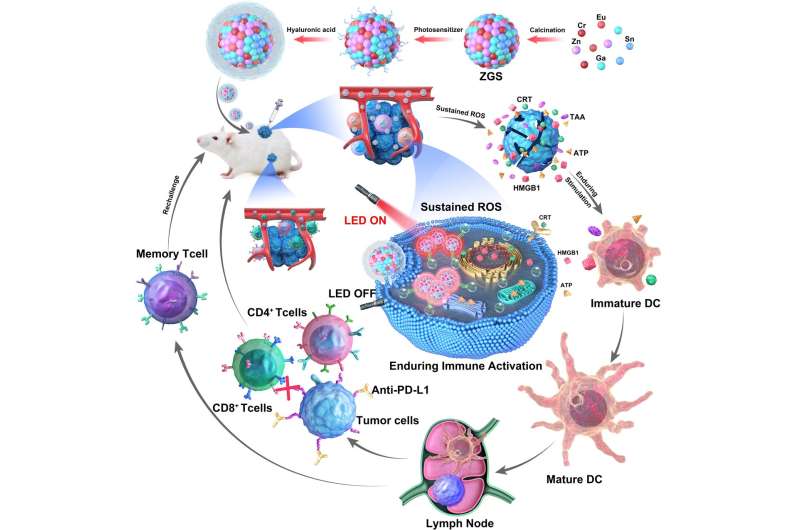Novel targeted nano-immunostimulant for cancer immunotherapy developed

Immunotherapy is promising for cancer treatment. The key to improving the therapeutic effect is to drive the patient's own immune system to produce a strong, effective, and enduring tumor-specific immune response. Engineered nanoplatforms show promising potential in strengthening antitumor immune responses.
However, the current nanotherapeutic platforms are limited by intrinsic material properties and stimulate the immune system only in a transitory and limited manner, which translates into an insufficient immune response and low therapeutic efficacy.
Recently, a research group led by Prof. Zhang Yun from Fujian Institute of Research on the Structure of Matter of the Chinese Academy of Sciences developed a novel targeted nano-immunostimulant based on persistent luminescence nanoparticles (PLNPs) for efficient and sustainable antitumor immune response.
Their study was published in Advanced Functional Materials on Sept. 27.
The novel targeted nano-immunostimulant, ZGS-Si-Pc@HA, was fabricated by coupling PLNPs with a photosensitizer and hyaluronic acid for sustained immune stimulation upon irradiation with biological window light.
Using a simple acetylacetonate combustion method, the researchers prepared a renewable NIR-emitting Zn3Ga2Sn2O10: Cr3+, Eu3+ (ZGS) PLNPs. After functional modifications with silicon phthalocyanine (Si-Pc) and hyaluronic acid (HA), ZGS-Si-Pc@HA could induce sustained reactive oxygen species (ROS) directly to destroy tumor cells and to stimulate immune responses by triggering the maturation of dendritic cells and secretion of cytokines.
Combined with the clinically approved PD-L1 checkpoint blockade therapy, ZGS-Si-Pc@HA was able to efficiently eliminate primary tumors directly exposed to lasting reactive oxygen species, and inhibit distant tumors by employing the durable antitumor immune responses.
Besides, the researchers observed a significant immune memory effect for mice after treatment to enable effective protection of mice from rechallenged cancer cells, achieving a synergistic, efficient and durable anti-tumor immune response.
This work provides an enlightening strategy for cancer immunotherapy, which may shed light on the study of tumor metastasis and recurrence.
More information: Ruoping Wang et al, Sustained Antitumor Immunity Based on Persistent Luminescence Nanoparticles for Cancer Immunotherapy, Advanced Functional Materials (2021). DOI: 10.1002/adfm.202106884
Journal information: Advanced Functional Materials
Provided by Chinese Academy of Sciences





















